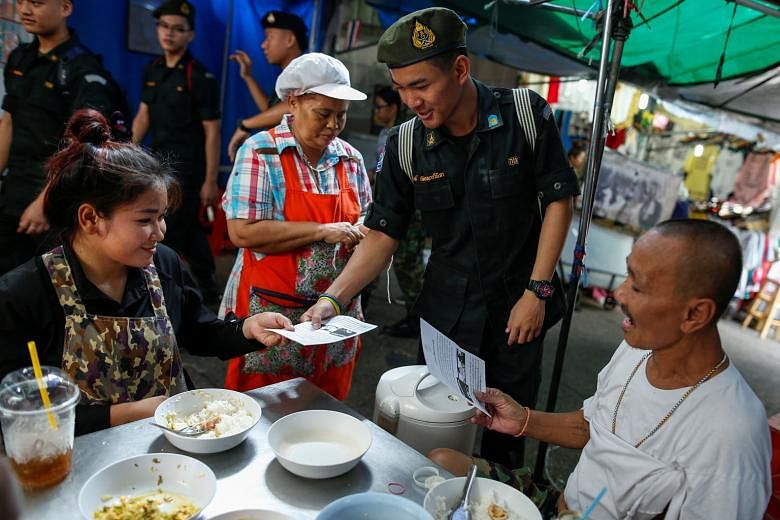Thailand's military regime has begun to draw red lines around public opinion in the run-up to a referendum in August on a proposed new Constitution, which appears designed to significantly weaken subsequent elected governments.
"Don't campaign and don't influence the referendum. Let people be free to think," Thai Deputy Prime Minister and Defence Minister Prawit Wongsuwan told reporters yesterday. "If you disagree, then just tick that box."
That the army is serious was amply demonstrated on Monday when a senior member of the Puea Thai party, Mr Watana Muangsook, was arrested by soldiers in what one eyewitness called a "show of force" - even as he presented himself to surrender and be taken to a fourth round of what the regime calls "attitude adjustment".
Mr Watana had been critical of the proposed Constitution on his Facebook page, writing: "No matter how many times you adjust my attitude, I will not accept this draft Constitution."
As he was being led away by soldiers on Monday, who barged through a throng of journalists to apprehend him, he insisted that his detention was illegal and demanded to be released by that afternoon.
But up to last night, there was no sign of his release.
A small group gathered at the busy Victory Monument intersection in Bangkok to protest against his detention, but there were scores of policemen who arrested five of them and took them to a nearby police station.
One protester, an assistant professor at a Bangkok university, said: "We are pro-democracy. We want to send a message that just because we are silent doesn't mean we are scared." But she asked not to be named or photographed.
General Prawit, widely seen as a hardliner, said on Monday that anyone wearing anti-Constitution T-shirts will have them removed.
"You can like or dislike (the charter), but don't express it (to the public), and keep it inside your head," he reportedly said.
He was referring to groups who have been quietly campaigning against the Constitution. On Sunday, one group wearing white T-shirts with the words "Vote No" read out a statement arguing against the Constitution.
Under the rules, those deemed to be spreading "information deemed distorted, violent, aggressive, inciting or threatening so that voters do not vote or vote in a particular way" could face up to 10 years in jail and a fine of up to 200,000 baht (S$7,700).
Political science professor Panitan Wattanayagorn, who is an adviser to Gen Prawit, said that "to criticise is fine, but to allow campaigns to vote 'yes' or 'no' risks confrontation and (the military government) does not want that".
It would be Thailand's 20th Constitution in 84 years since the abolition of absolute monarchy in 1932.
The proposed Constitution vests significant power in a 250-member Senate that will be essentially controlled by the military.
The Puea Thai party, whose government was kicked out of office by the military in 2014, said the party "will not accept a charter in which real power does not belong to the people". The Democrat Party, the country's second-largest, has also objected specifically to the provision on the appointed Senate.


